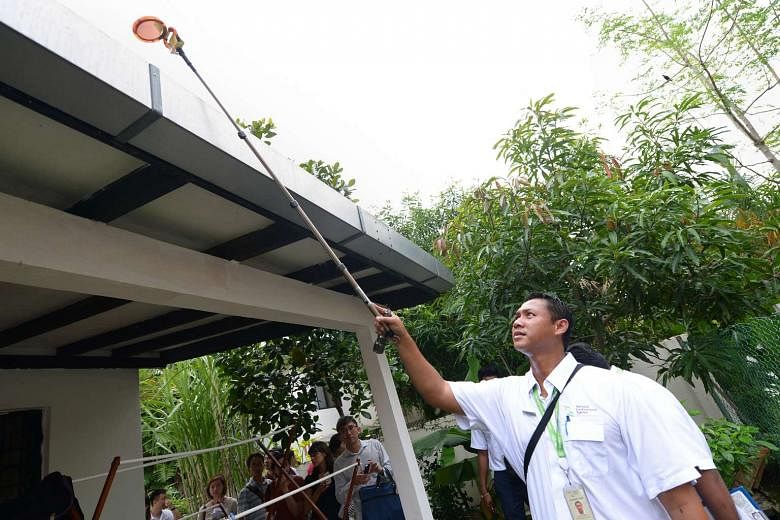SINGAPORE - A total of 361 dengue cases were reported last week, the highest weekly number recorded so far this year, the National Environment Agency (NEA) said yesterday.
While higher weekly numbers have been recorded in the past two years, with a weekly high of 891 cases last year and 842 in 2013, these were recorded around June and July - not towards the end of the year.
Four people have died of dengue fever this year, three in recent months. Last Wednesday, a 59- year-old woman died at Khoo Teck Puat Hospital. She lived in Jalan Minggu, in Upper Thomson, an active dengue cluster.
On Nov 28, a 79-year-old man died a few days after being admitted to Tan Tock Seng Hospital. The other victims were a 60-year-old from India who was visiting her son here in September, and a 53- year-old woman from China who died in February.
Dengue outbreaks are usually triggered by the interplay of weather conditions and a change in the dengue strain, according to Professor Annelies Wilder-Smith, who studies infectious diseases at the Lee Kong Chian School of Medicine.
While the number of dengue cases in the first 10 months of this year fell by about half compared with the same period last year, the Aedes mosquito population has doubled.
The NEA said warmer than usual year-end weather caused by the El Nino phenomenon could result in shorter mosquito breeding periods and shorter incubation times for the dengue virus.
The DENV-2 serotype, which had been the dominant strain before 2013 until it was replaced by DENV-1, has now returned.
Dengue cases due to the DENV-2 serotype have increased, accounting for half of all cases here.
A switch in the dominant strain usually signals a higher number of infections as fewer people would have immunity.
A total of 10,142 dengue cases were reported as of Dec 12. In the whole of last year, there were 18,335 cases with five local deaths.
There were 60 active dengue clusters as of Monday, with 114 cases recorded in the largest cluster of Tampines Avenue 3 and Avenue 4, and Tampines Street 81 and Street 91.
Twenty-three of the cases were identified with the DENV-2 strain.
The longest-existing cluster, which has been around since Oct 13, is at Eastwood estate in Bedok.
IT surveillance consultant Eric Lee, 47, was hospitalised for five days after contracting dengue early last month. The Eastwood Way resident suspects that he contracted the disease within his housing estate. "Mosquito breeding in this estate is still prevalent," he said.
The NEA said anyone infected with dengue should apply mosquito repellent to prevent mosquitoes from biting them and infecting others, and that those with symptoms should consult a doctor.


